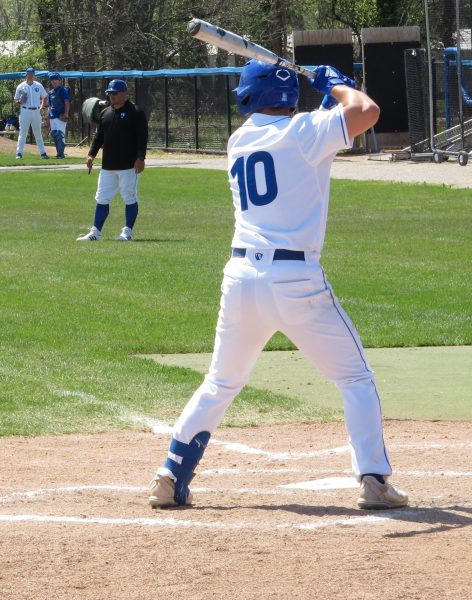Unseen work fuels sports operations
The equipment used to support and protect athletes on campuses across the nation is ordered, configured, fitted and maintained by trained coordinators who use precise skills and attention to detail to supply the needs of each training session, practice and game.
Clint Bays, in his fifth year as coordinator of Equipment and Stadium Facilities at Eastern, said he has gone through plenty to earn and retain his title.
“You have to have a couple thousand hours of on the job training and then take a certification exam,” Bays said. “Then you have to continue doing education units each year to keep your certification.”
Beyond this, day-to-day tasks are a time commitment filled with a different array of jobs to complete, depending on the time of year, Bays said.
Athletes will of course sweat, collide and bleed, which Bays said must be taken care of quickly when it comes to the locker room environment.
“Most days I get in at nine in the morning and leave between seven and eight at night,” Bays said. “We’ve got disinfectant sprays to use throughout the locker room and we all wear gloves. We use hydrogen peroxide to dilute and disperse blood out of uniforms.”
Sports like football use plenty of equipment, which also becomes fairly damaged over time.
Bays’ certification and experience allows him to deal with it in short, in case the need for immediate assistance arises, which is especially critical with in-game malfunctions.
Without it, health issues can spring up, or a player may be delayed in returning to action.
“It’s a big safety issue to make sure that helmets and shoulder pads contact in the appropriate areas,” Bays said. “Everything from your head, rib cage, shoulders, and upper arms are protected. It’s a dangerous sport. There are big strong guys out there.”
Pushing the responsibility further is the travel aspect.
Any necessities left behind in Charleston do no one any good if a game is being played down in Kentucky.
The task of packing, loading and inspecting is crucial to mobilizing the Panthers.
“I’ve got checklists to make sure the players have packed everything they need,” Bays said. “I’m nervous from when we pull out of the parking lot to game time that I’ve forgotten something. Everything from shoe strings to uniforms and repair kits. I wish there was a way to transport the whole equipment room to each away game, but there’s not.”
Beyond all of the hustle and bustle, an exchange between everyone who depends on the equipment room builds strong relationships, with one group especially.
“The players,” Bays said. “It’s hard to see some of the players leave because you’re with them so many hours each week, you grow attached to them. You’re with all these people, the coaches, the strength staff, the athletic trainers so many hours a day they become a family to you.”
It is almost like having another family here, he said.
Since most sports at Eastern are out of season, along with the pace slowing in Charleston, activity behind the scenes will be picking up fairly soon. Bays and his assistant Bobbie Clark are gearing up for an increase in work volume.
“July is a bad month because that’s when we get our new shipment of inventory,” Bays said. “All the equipment has to be sorted, inventoried, and put on the computer database to keep track of everything. So July we’re here a lot of hours.”
The operation Bays runs is year-round and takes a load of stress off the backs of the athletes, coaches and staff when it comes down to precision with equipment and getting your hands dirty.
Joshua Bryant can be reached at 581-2812 or [email protected].












































